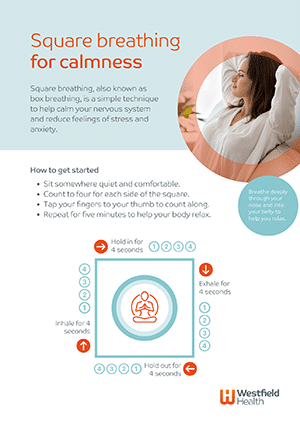These days it’s common to feel like we’re ‘always on’ and it can be difficult to take time out when our to-do lists are growing or a big deadline is approaching. But making time to unwind is a great way to increase our energy levels and lessen the impact of stress in the workplace.
If you’re feeling the strain and it’s affecting your mood, try these easy pointers to help you bust stress and prioritise relaxation. Give them a go and see what works for you, then plan how you might work regular relaxation into your daily routine.
How environmental signals can get you ready to relax
While you might not be ready to master feng shui, it’s worth taking the time to set up your space in a way that helps you relax. To create a calming environment that suits your needs, try rearranging your furniture, tidying any loose cables and adding soft furnishings such as blankets or pillows.
Remember to keep your space clear of clutter to help you gain a sense of control in stressful times. This is especially important if you work from home and don’t have separate areas for work and relaxation.
You can also make a habit of performing certain actions, known as ‘signals’, at a similar time each day. Signals can help remind your mind and body that it’s time to switch off. If you’re struggling with blurred boundaries, a simple after-work ritual can help you relax at the end of the day.
Some signals you could include in your routine include:
- Changing your clothes
- Putting on some music
- Lighting some candles
- Taking a shower
- Going out for a short walk
Try scheduling short self-care breaks
If your days feel jam packed and you’re struggling to fit in some me-time, it’s important to keep your expectations realistic by making one or two smaller adjustments.
Planning something to look forward to or trying something new can be a great way to take your mind off a stressful day at work. You could:
- Start a gratitude diary
Boost your mood by writing down three things you are grateful for each morning. - Plan a self-care hour
Try setting aside an hour once a week as your designated chill-out time. This could include a relaxing bath or an online yoga class. - Reduce your screen time before bed
Immerse yourself in a book instead of watching TV to prepare your mind for a better night’s sleep. - Get creative
Activities such as knitting, scrapbooking or colouring can help calm your mind. - Schedule some social chill time
Rather than planning a big event, try simply scheduling a call with a friend or playing a boardgame at home.
Square breathing for relaxation
Square breathing, also known as box breathing, is a simple technique to help calm your nervous system and reduce feelings of stress and anxiety. You can do it any time you need a moment to unwind. Here’s how:
- Find a quiet and comfortable place to sit.
- Tune into your breath and begin slowing it down.
- Count to four for each stage of the breath: inhale, hold in, exhale, hold out.
- Breathe deeply through your nose and into your belly to help you relax.
- Try tapping each of your four fingers to your thumb to count along.
- Repeat for five minutes to help your body relax.
You can download our free square breathing poster to share via email or print out as a reminder:
Resources and videos
Struggling to think of new ways to relax? Try these links, activities and videos for more inspiration:
